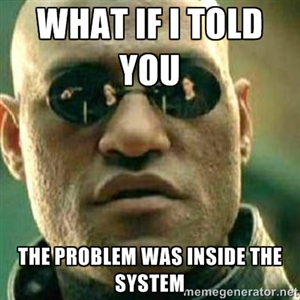A great debate has raged since the Deists of the Enlightenment first lost their ground to the greater and more intellectual class, the Atheist. The great Atheist has all but replaced the Deist, and has freed himself of the the dark age superstition and frivolous celebration of the Theist, particularly the worst of all Theists, the Christian. This debate has always been focused on the existence, or lack there of, of God. Though there are those who are apathetic to this debate, anyone involved in it will tell you that the question of God’s existence is perhaps the single most important question in all of human history. I find however, that Atheists, in their proposal on the topic, align themselves quite oddly. Almost all of the atheists in our present age belong to a certain, and very peculiar, school of philosophy. More often than not they do not know that they belong to this group, but they are all the same a part of it.So, the atheists of the internet are now rather suspicious, and rightfully so.
You, my very esteemed colleagues are what is referred to in philosophy as “Naturalists.” So, what does the naturalist, and thus the atheist, believe? Well, first and foremost, that there is no God, and that matter and energy are eternal, and the only true reality. They also believe in a closed (that is free from any “other-worldly” interference) system of cause and effect which is the principle of all interaction in the universe. Naturalists believe that life came to be through a multitude of astronomically improbable coincidences. They do not believe in objective moral duties as, in a system of pure cause and effect, morality exists only for survival and comfort. Conscious life is simply a part of the evolutionary system, and mankind, like all organisms, is driven by the programming of their genes and surroundings, to quote Richard Dawkins we “dance to our DNA.”
And so, we have it; the Atheist (at least the rational, typical, intellectual atheist) is a Naturalist. With this, they can all just live in a nice, quaint, little society. They can have their naturalism, their empiricism, their love for science, and best of all, their lack of objective moral norms. Thus, the Atheist can live happily ever after. Right?
Enter Fredrich Nietzsche, renowned 19th century philosopher and outspoken atheist, and enter the peculiarity of the Naturalist.
Although Nietzsche agrees with the Naturalist in all accounts, he looks at the Naturalist with a mix of utter contempt and amusement. Starting with the assumptions of the Naturalist, Nietzsche begs the question; if God is dead, what do we do? This is a very rational question, as God has for some two thousand years been the center of Western Civilization, and with a real acceptance of his non-existence, we cannot simply go about our lives as we had beforehand. He also establishes a few other logical conclusions from Naturalism.
First, if we are to truly believe that the universe is a closed system of cause and effect, as Naturalism says it is, then we must realize that this means there is no such thing as choice. All decisions that any of us make, are simply imagined choice, and are really just unrecognized determinism. I’m sure there’s now an angry mob forming, but here me out.
If the universe is actually nothing more than a closed system of cause and effect, then we have accept that all events are just part of this grand machinery of cause and effect. And even if there is any chance in the universe, which there isn’t, it’s still, by virtue of there being no God, completely uncaring and unfeeling. The universe doesn’t care, all of mankind’s actions are meaningless and existence is just happening like clockwork.
Our second problem is a moral one. If there is no such thing as objective moral standards, then all value is either a fact of nature or a result of culture (we’re going to ignore the fact that claiming it to be a result of culture just pushes the fact of objective moral standards back a few generations for right now). If this is true, then we have no means by which to define the morality of an action, because to do one action, instead of another, is to set a higher objective value on that action than the other, which is counter-productive to the idea of moral relativity.
And finally, the great dagger to the heart of all empiricism. If there is no God, and man is nothing more than an inextricably complex biological machine, then so is his mind. If the mind is just a machine, then thought, which it produces, is merely an extension of cause and effect. Thoughts are nothing more than electric impulses and chemicals firing in the brain. We are left, in the absence of God, without any objective reference point for truth. If this is true, then we can have no trust for our perceptions of physical reality. There is no justifiable difference between reality and illusion.
Thus the atheist is left with quite a predicament; world and those around him, and there is nothing he can do to change. The Atheist, in his Naturalism, now must face the looming reality that he is in fact a Nihilist. He is completely alienated from the all of reality, if he is even perceiving a true reality. Alienated from everything and everyone; he may be free from the shackles of Theism, but he is left alone in the Universe, and lost in the Cosmos
.















